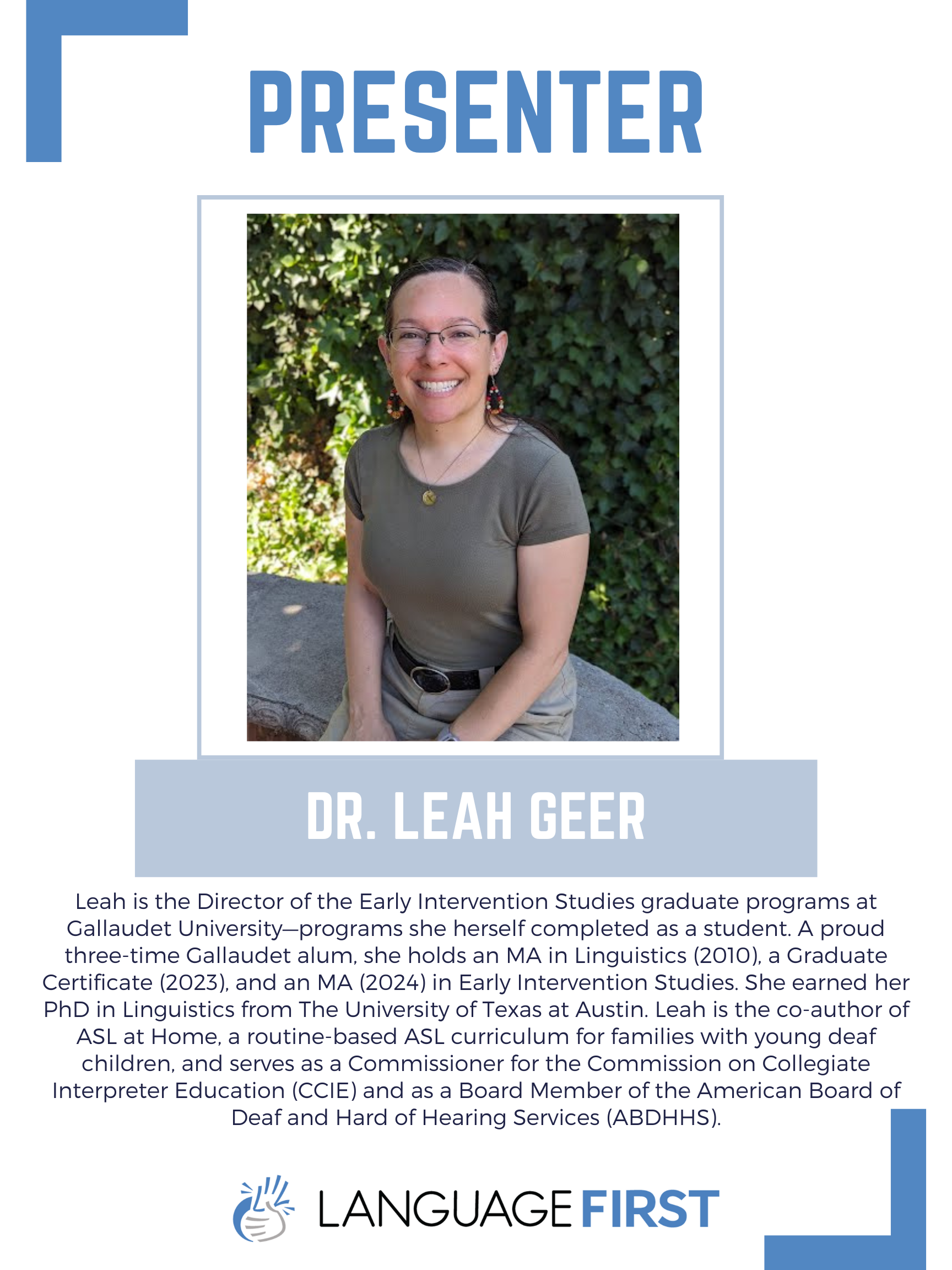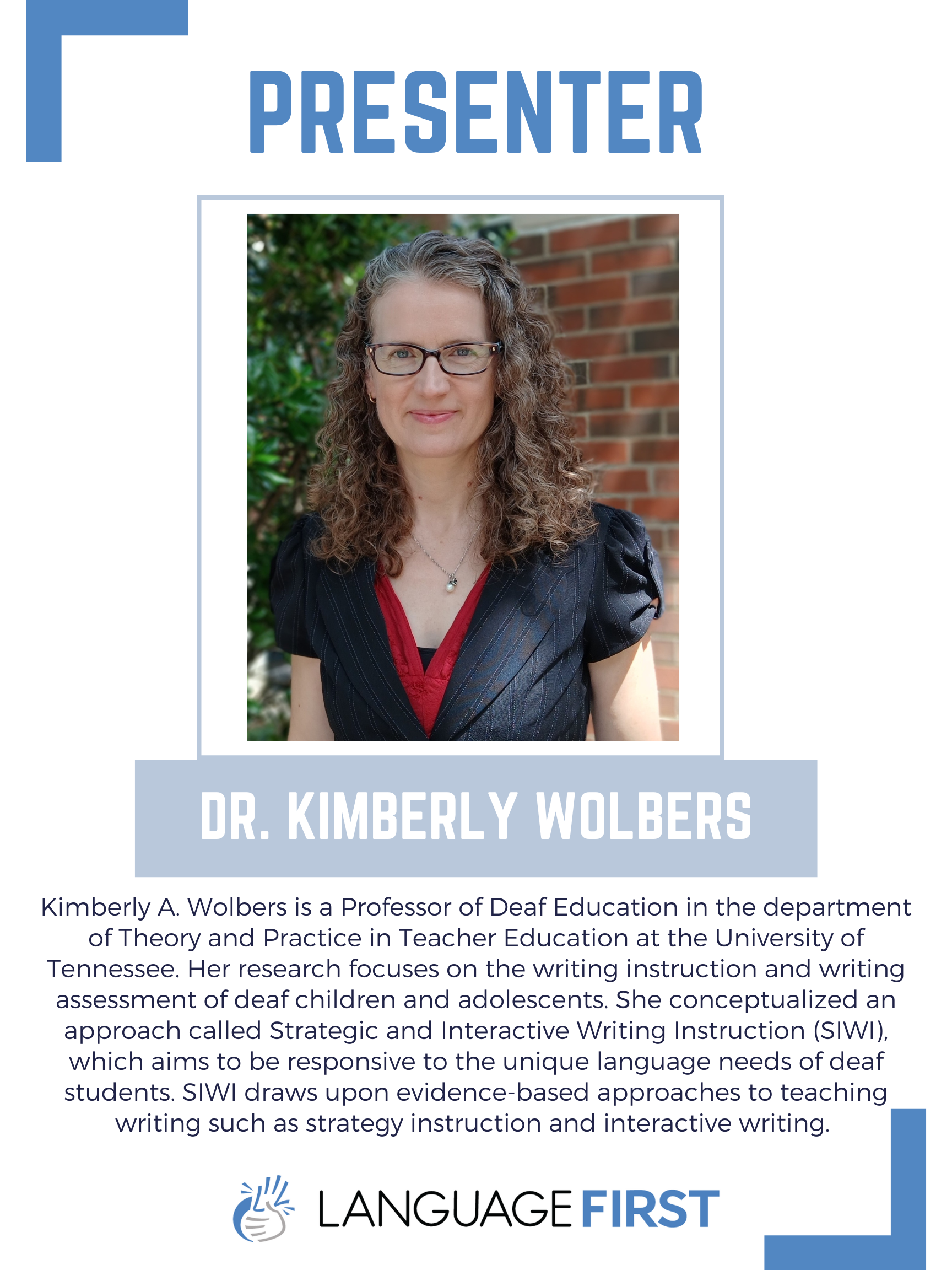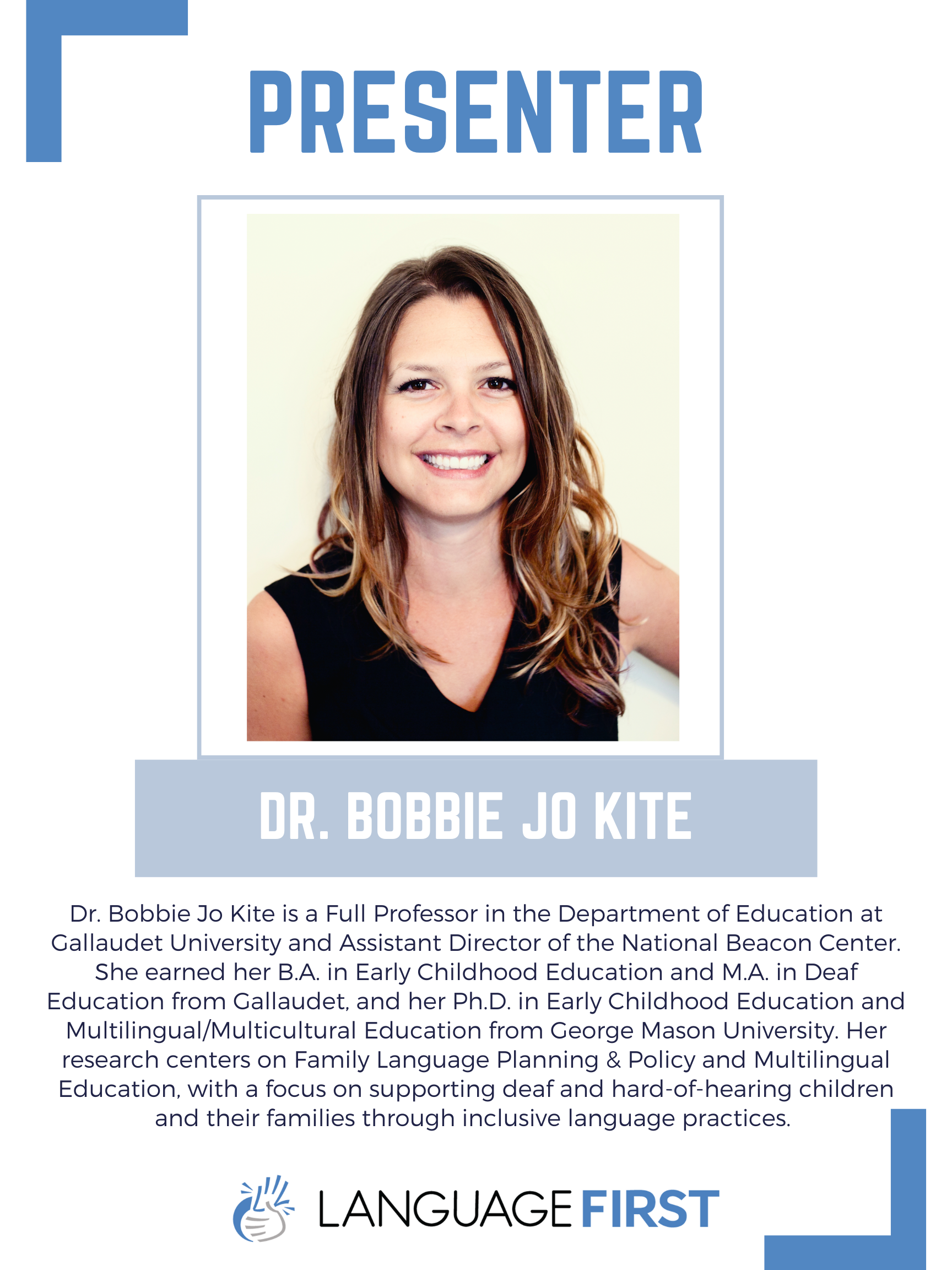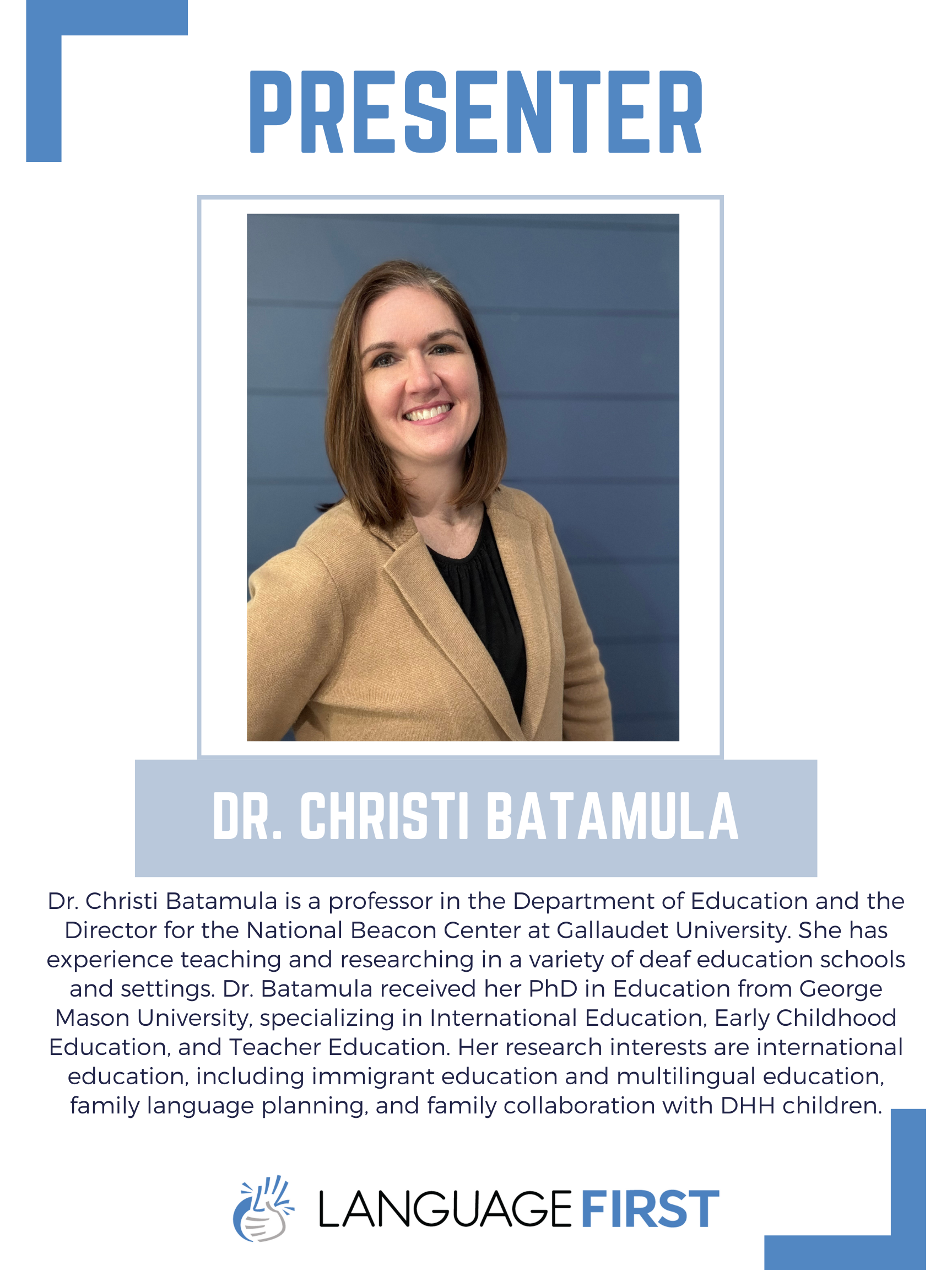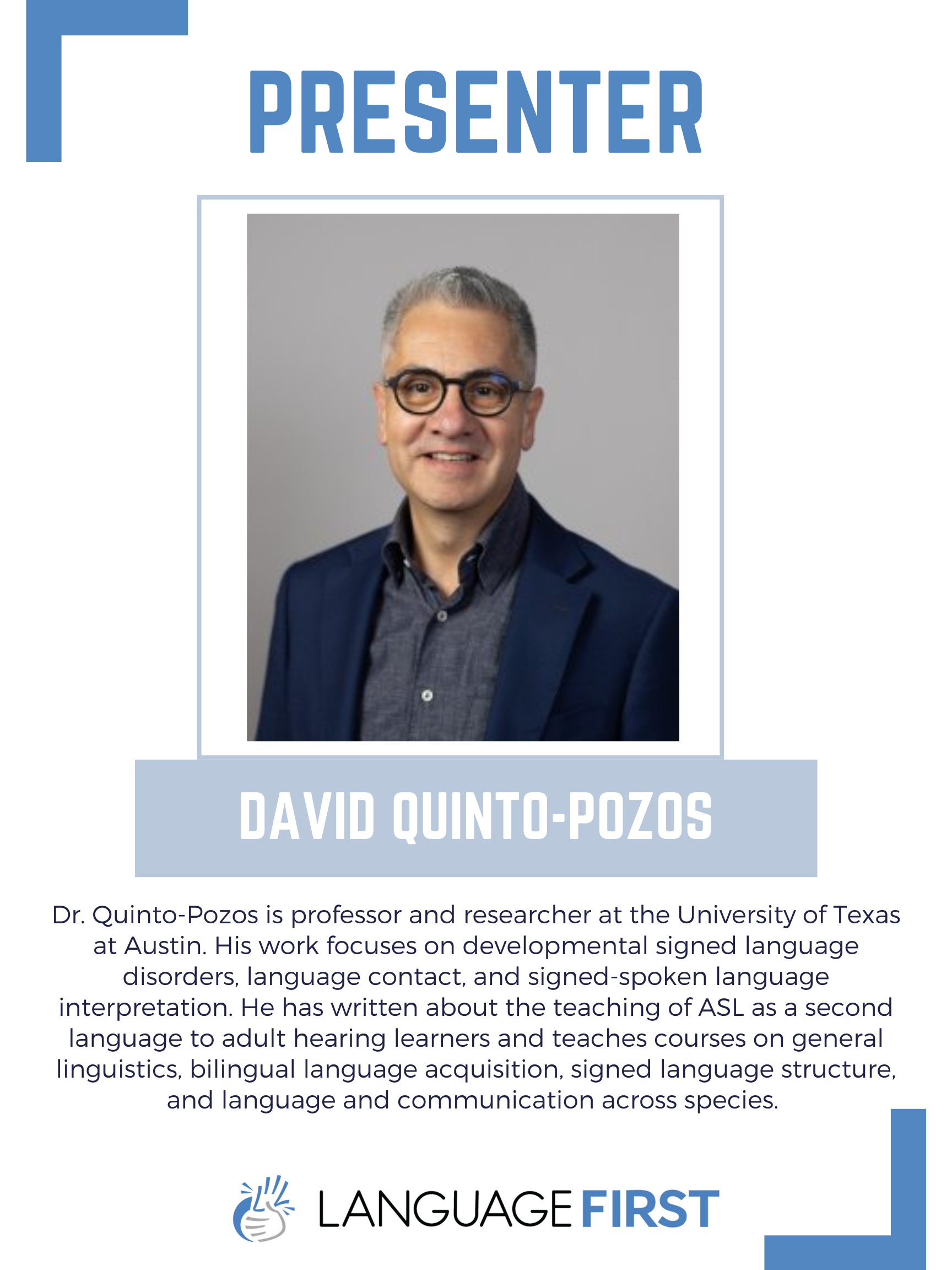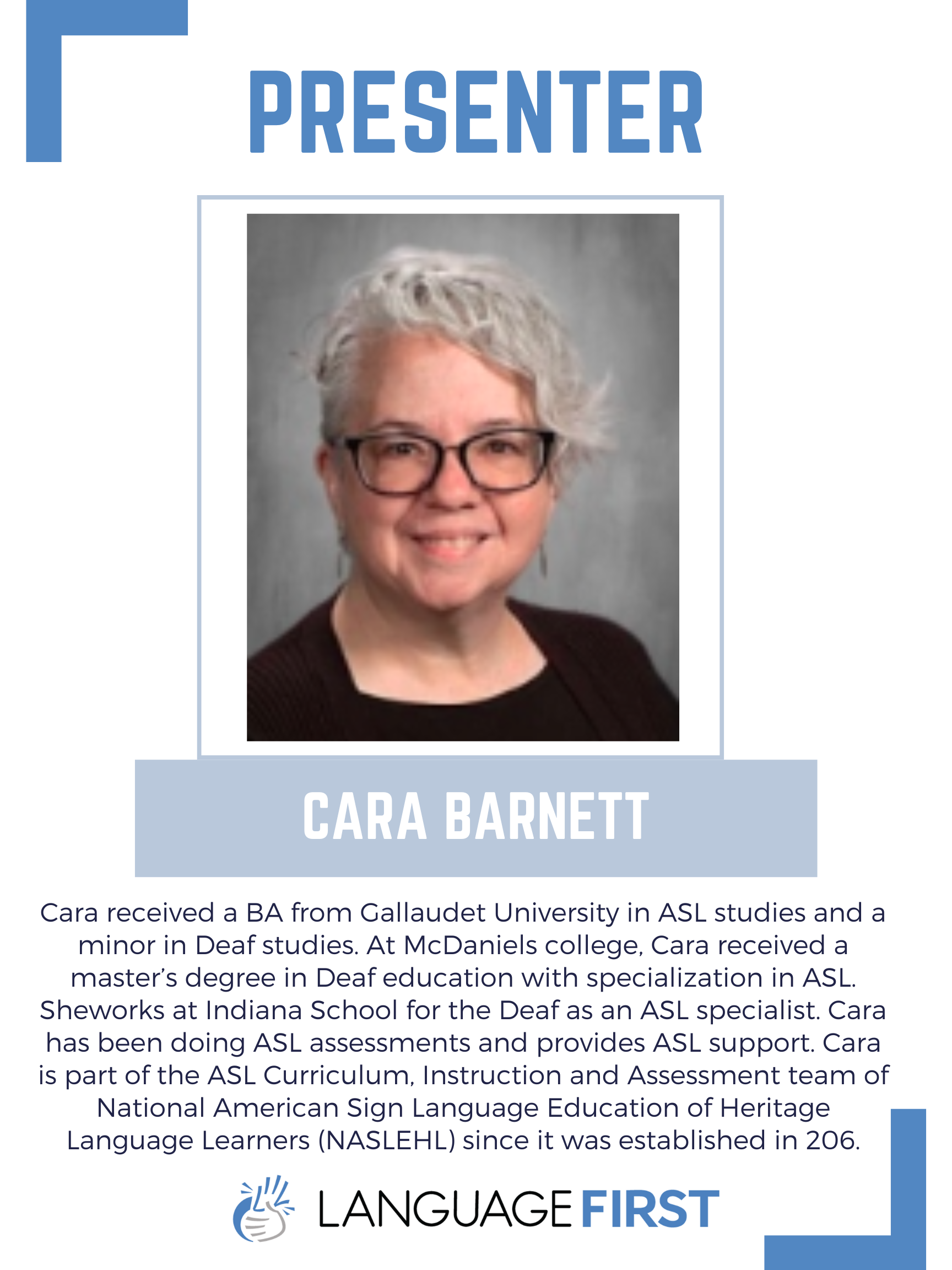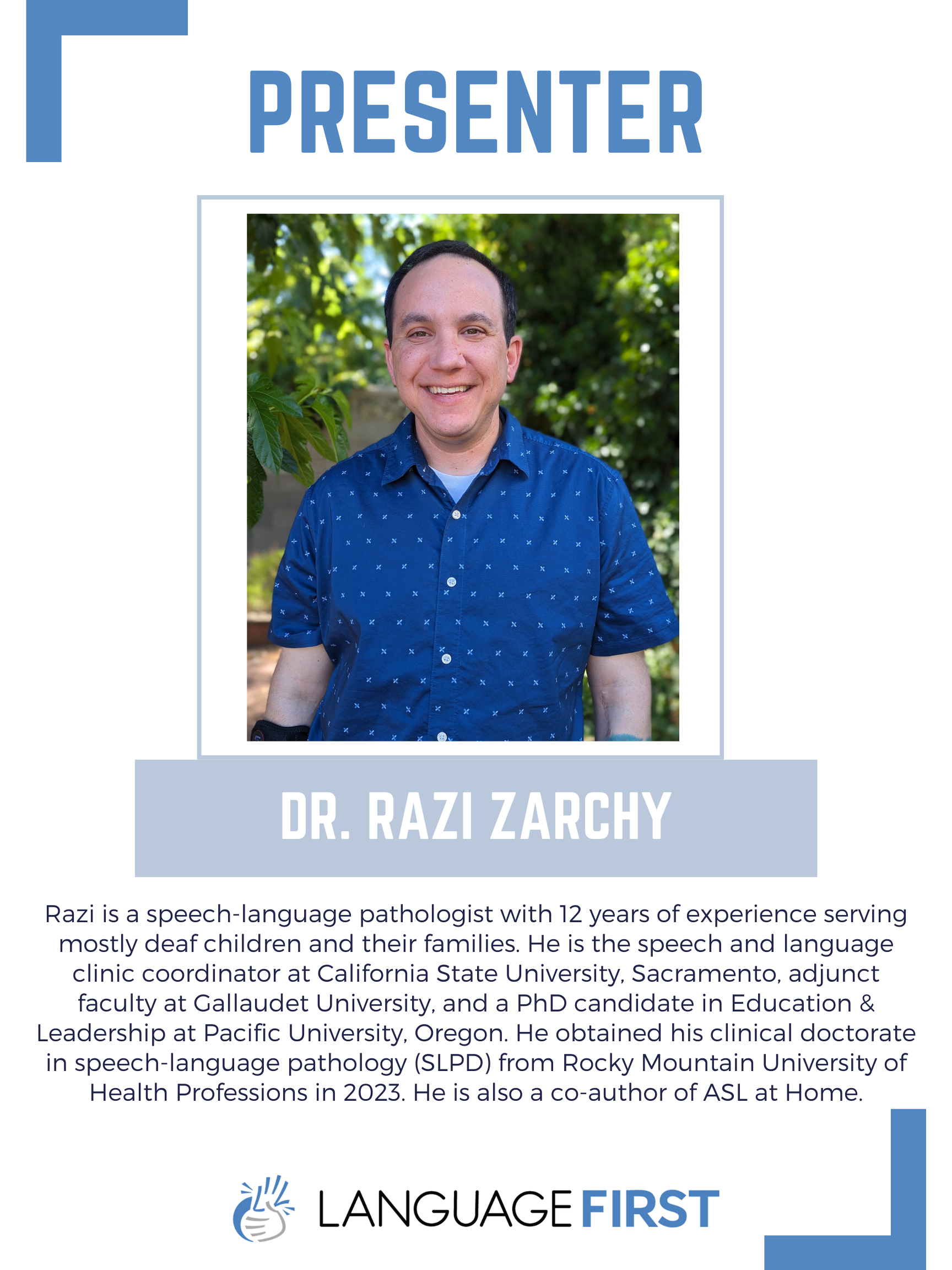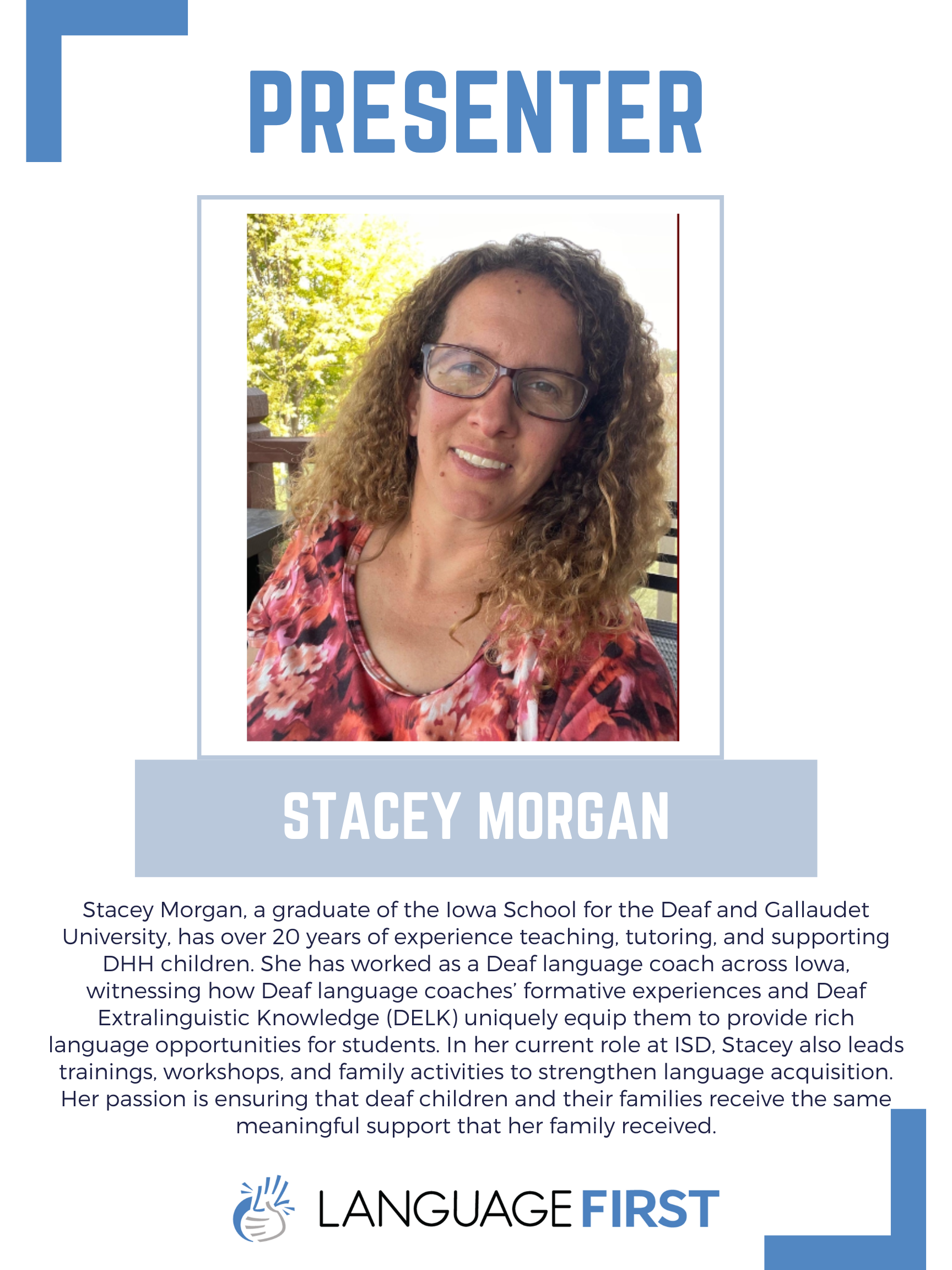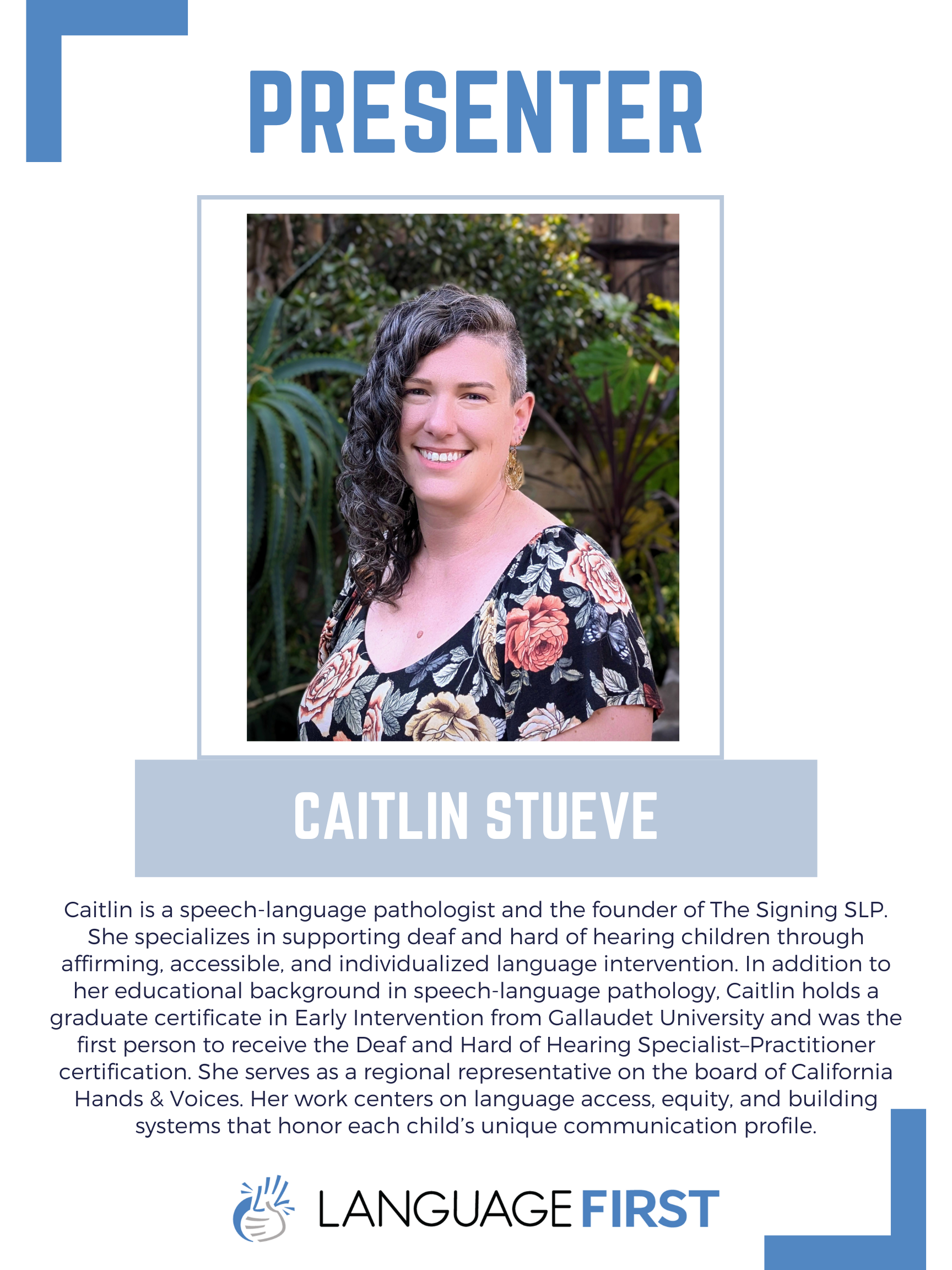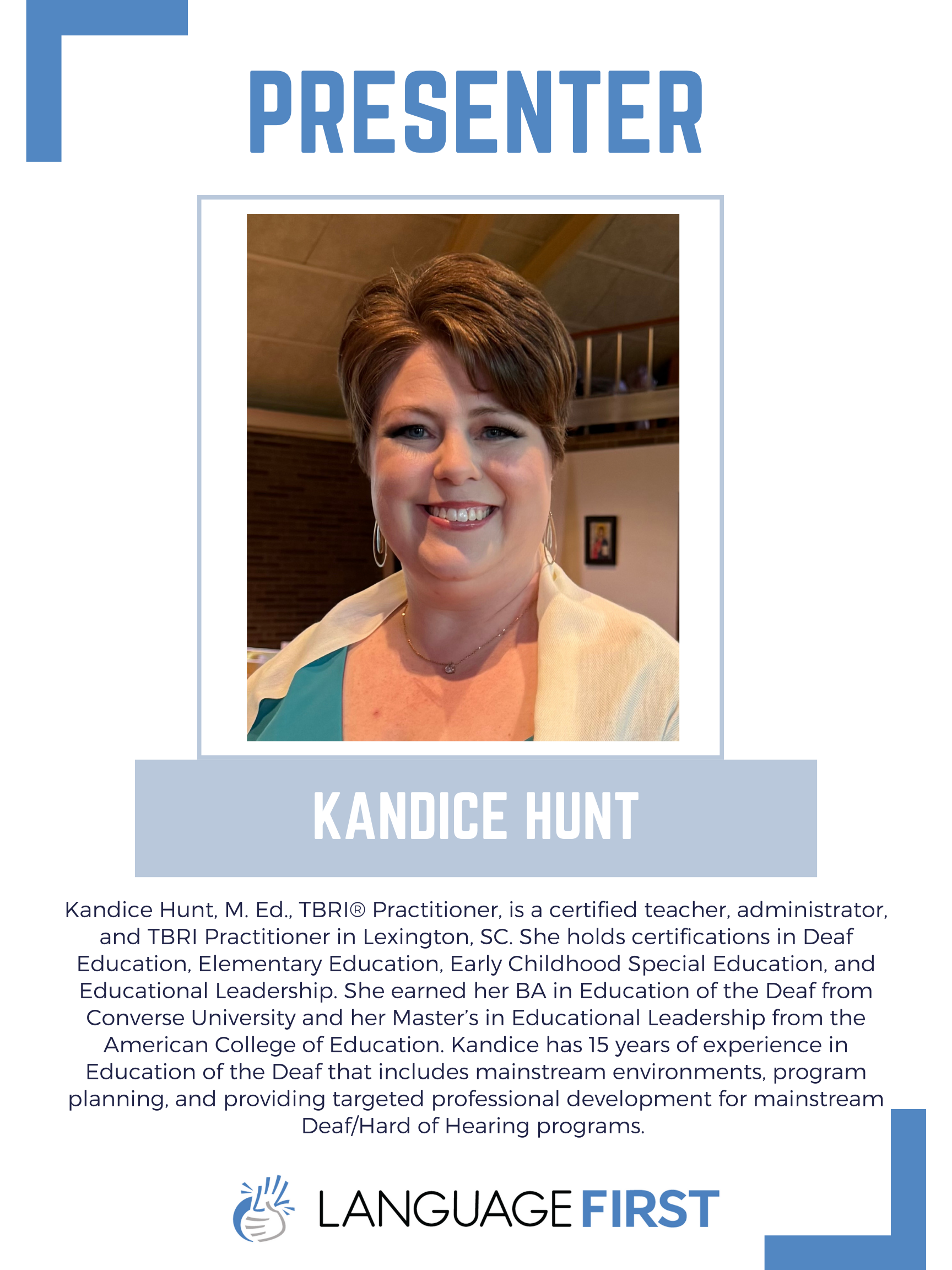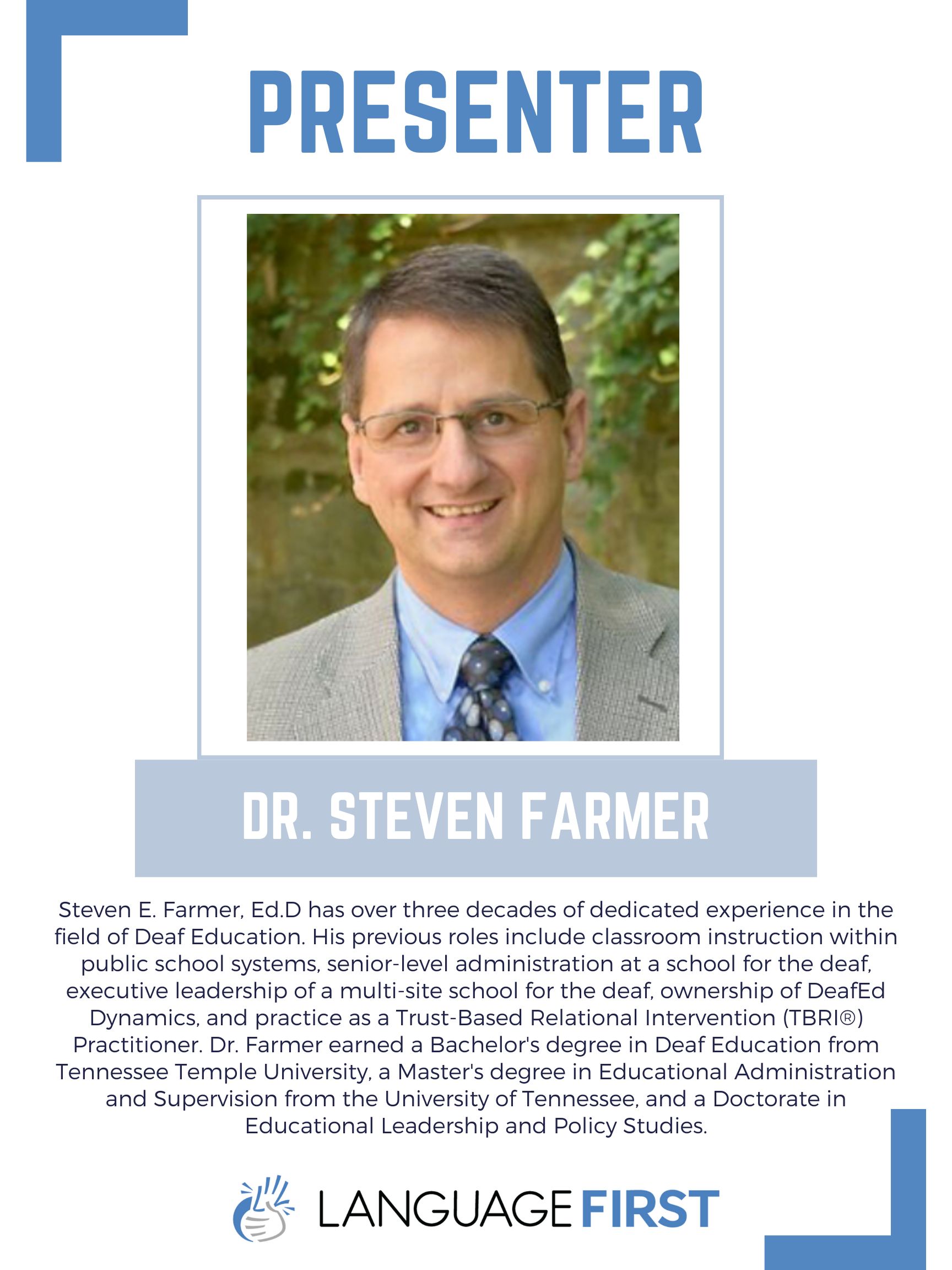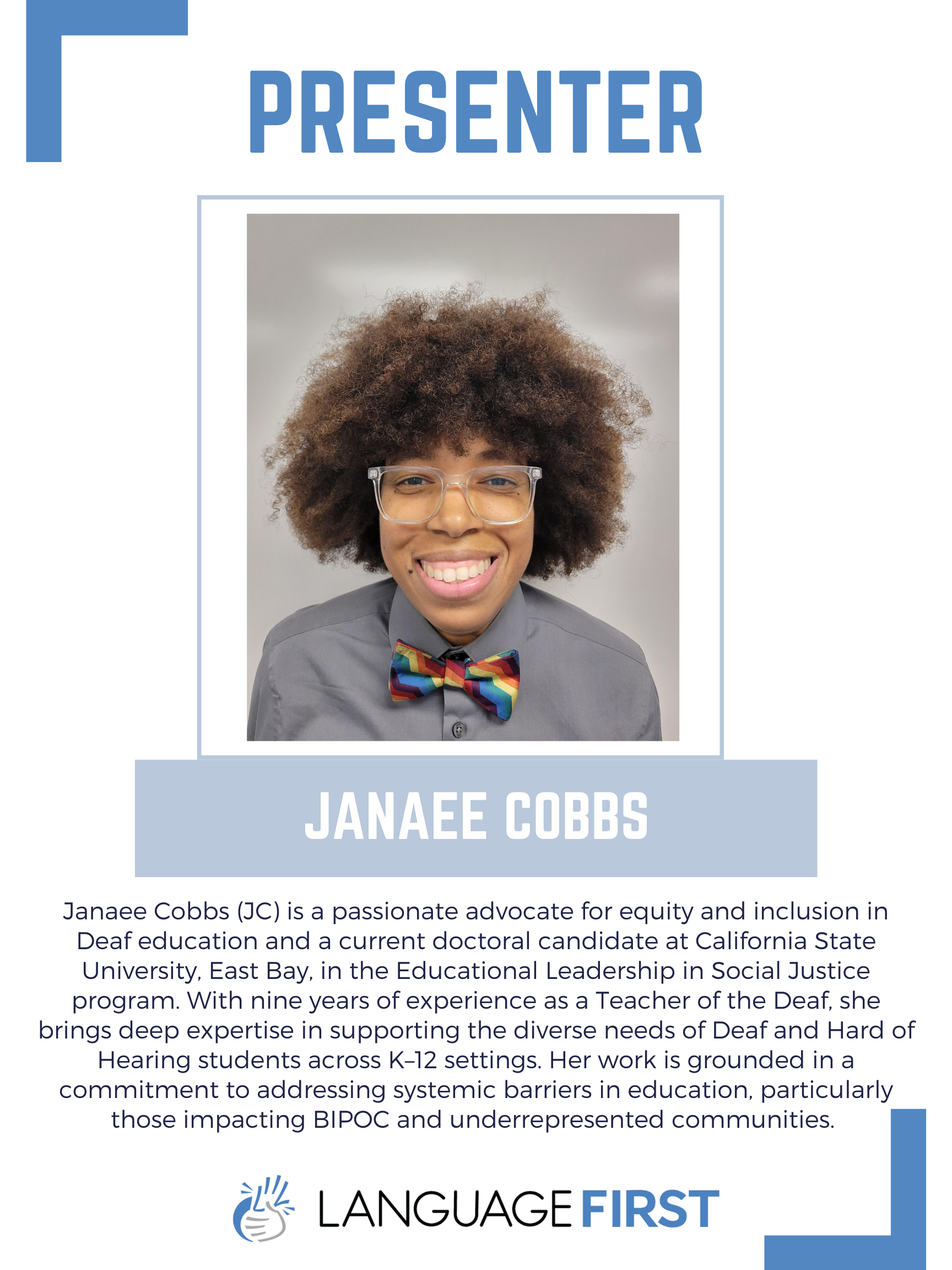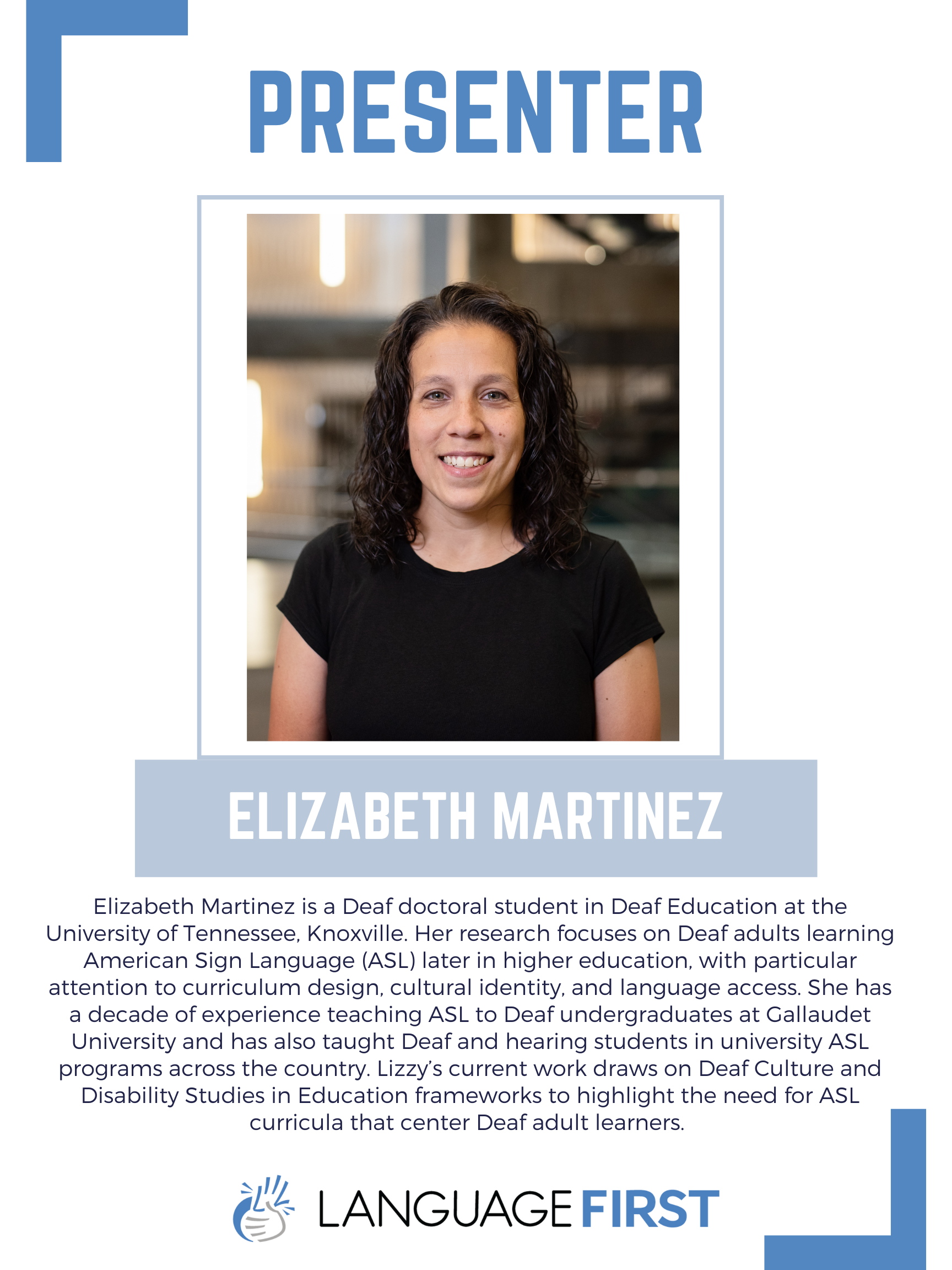2026 Language First Conference
The Language First Conference is an opportunity for professionals who work in deaf education to gather and learn best practices for working with Deaf and hard of hearing children utilizing an ASL-English bilingual approach. This year’s conference is in Knoxville, Tennessee.
An enormous thank you to our sponsors:
Tuesday, April 14
11:30 - 12:30 pm - American Sign Language Articulation Test (ASL-AT)
Dr. Leah Geer
Course Description:
Articulation skills are often assessed in spoken language, yet assessment tools for measuring and documenting articulation accuracy in American Sign Language (ASL) don’t yet exist. This session introduces a newly developed Articulation Test (ASL-AT) designed to pinpoint error patterns, consider etiology, and inform intervention planning. This presentation will share the test creation, structure, and administration, and will discuss its application in educational settings. Participants will leave with practical insights for using this tool to support accurate ASL production and foster collaborative work.
Agenda:
11:30-11:40 | Background & Rationale
11:40-11:55 | Test Creation
11:55-12:05 | Test Structure & Administration
12:05-12:15 | Educational Applications
12:15-12:30 | Q&A and Closing Remarks
Learner Outcomes:
By the end of this presentation, participants will be able to:
Describe the purpose and structure of the ASL-AT
Interpret sample results and analyze common ASL articulation error patterns
Discuss strategies for integrating assessment outcomes into intervention planning
Speaker Disclosures:
Financial disclosures: Dr. Geer is receiving an honorarium from Language First for presenting.
Nonfinancial disclosures: Dr. Geer has no relevant nonfinancial disclosures.
1:00 - 4:00 pm - Sign-Bilingual Writing Instruction with Deaf Students
Dr. Kimberly Wolbers
Course Description:
In this session, participants will explore motivating and research-based approaches to sign-bilingual writing instruction for Deaf students in grades 3–12. The sessions introduce principles from the Strategic and Interactive Writing Instruction (SIWI) framework, which provide guidance for planning sign-bilingual instruction and making instructional decisions during writing. Each section has an activity and self-reflection so that participants will leave with practical strategies that can be applied to their own work.
Agenda:
1:00 - 1:30 | Strategy instruction
1:30-2:00 | Interactive instruction
2:00 - 2:20 | Authentic and balanced principles
2:20-2:30 | Reflection, Q&A
2:30 - 3:00 | Responsive language strategies part 1
3:00 - 3:30 | Responsive language strategies part 2
3:30 - 3:45 | Responsive language strategies part 3
3:45 - 4:00 | Q&A
Learner Outcomes:
By the end of this presentation, participants will be able to:
Apply visual and explicit instruction for the writing genre in their own practice
Model and scaffold the writing process in their own practice
Apply responsive language strategies in their own practice
Speaker Disclosures:
Financial disclosures: Dr. Wolbers is receiving an honorarium from Language First for presenting.
Nonfinancial disclosures: Dr. Wolbers is the creator of SIWI.
Wednesday, April 15
Thursday, April 16
8:15 - 9:15 am - Applying Evidence-Based Instructional Strategies to ASL/English Literacy Instruction
Dr. Leala Holcomb
Course Description:
This presentation examines existing evidence-based instructional methods and the instructional framework for their application in ASL/English literacy education for deaf students. Attendees will gain insights from recent research evaluating the effectiveness of this newly proposed framework. Findings suggest that high-quality professional development plays a crucial role in transforming teaching practices and improving student language and literacy outcomes.
Agenda:
8:15 - 8:20 | What is Literacy?
8:20 - 8:35 | ASL Literacy
8:35 - 8:50 | Evidence-Based Methods
8:50 - 9:05 | Current State of ASL Literacy Instruction
9:05 - 9:15 | Q&A
Learner Outcomes:
By the end of this presentation, participants will be able to:
Explain how existing evidence-based instructional methods can be applied to ASL/English literacy instruction
State the importance of connecting research to practice in ASL/English literacy instruction
Examine recent research on the correlation between instructional methods and deaf students' ASL/English skills
Speaker Disclosures:
Financial disclosures: Dr. Holcomb is receiving an honorarium from Language First for presenting.
Nonfinancial disclosures: Dr. Holcomb directs a non-profit organization called Hands Land, which was established for the purpose of sharing information about language play through ASL to families, teachers and children.
9:30 - 10:30 am - The FLP Tool: Strategies for Multilingual Language Use in Families with D/HH Children
Dr. Bobbi Jo Kite & Dr. Christi Batamula
Course Description:
Thius interactive presentation will introduce the Family Language Planning (FLP) Tool, designed to support families with deaf and hard-of-hearing (D/HH) children in navigating and maintaining multiple languages within the home and community. Many families of D/HH children aim to use two or more languages, often including sign language, written language, and spoken language when appropriate, but face significant challenges in maintaining multilingualism. Effective planning can help families align their language practices with their values and goals. The presentation will begin by introducing the FLP framework and sharing key research findings from our work with families of D/HH children in the United States and Canada. Participants will engage in discussions around the various factors that influence family language planning, including access, identity, and community support. The presenters will share practical strategies and steps for creating a family language plan, along with guidance for identifying relevant resources that can support multilingual language use at home and in broader social contexts. Attendees will explore the toolkit, practice using its planning tools, and reflect on how they can adapt them to their own or others’ contexts. The session will conclude with a group discussion and reflection on the planning process and its implications.
Agenda:
9:30 - 9:40 | Introduction to the FLP and research
9:40 - 9:50 | Group discussions about factors influencing language planning
9:50 - 10:00 | Strategies in FLP with families
10:00 - 10:20 | Mock planning
10:20 -10:30 | Sharing, reflection, Q&A
Learner Outcomes:
By the end of this presentation, participants will be able to:
Identify key factors that influence family language planning for deaf and hard-of-hearing children
Apply the FLP framework and toolkit to develop strategies that align language practices with families’ values and goals
Reflect on how the FLP Tool can be adapted to diverse family and community contexts to support multilingual language use
Speaker Disclosures:
Financial disclosures: This work was supported by the Canadian Hearing Services Global Partnerships for Research and Innovation grant award. The authors have no additional financial relationships or conflicts of interest to disclose.
Nonfinancial disclosures: The presenters are professors of the Department of Education at Gallaudet University.
11:00 am - 12:00 pm - Examining Signed Language Challenges of Early and Late Exposed ASL Signing Deaf Children
Dr. David Quinto-Pozos & Cara Barnett
Course Description:
Deaf children exhibit variability in their signed language acquisition. This variability may be related to the age of exposure to signed language, or the presence of a developmental language disorder or other diagnosis associated with language difficulties. We surveyed professionals with experience working with deaf signing children and asked them to estimate percentages of children from each group (early vs. delayed access) that demonstrate challenges in specific areas of language acquisition. The purpose was to identify differences between children with early and delayed exposure and describe profiles of strengths and needs (e.g., sign vocabulary, grammatical features, or fingerspelling) for each group. Results and implications for practice with signing deaf children will be discussed.
Agenda:
11:00 - 11:15 | Introduction & Background
11:15 - 11:30 | Methodology
11:30 - 12:00 | Results & Analysis
12:00 - 12:30 | Implications for Practice & Discussion
Learner Outcomes:
By the end of this presentation, participants will be able to:
Describe profiles of language challenges for children with early and late access to signed language
Explain implications of these profiles on service delivery to deaf children who need language support
Identify the benefits of linear mixed modeling with these data
Speaker Disclosures:
Financial disclosures: The presenters received funding from Language First to present at this conference.
Nonfinancial disclosures: The presenters have no relevant nonfinancial disclosures.
2:00 - 3:00 pm - Breaking Barriers and Building Skills: Family ASL Classes on Campus
Dr. Leah Geer & Dr. Razi Zarchy
Course Description:
In this presentation, we will share findings from a research project on an in-person family American Sign Language (ASL) class designed for families of deaf and hard of hearing (DHH) children. Using the ASL at Home curriculum, we not only served as lead instructors, but also provided specialized training to speech-language pathology (SLP) graduate students in parent coaching strategies and effective collaboration with families of DHH children. We surveyed families taking the class (the experimental group) and the control group on four variables: Deaf Community Cultural Wealth (DCCW) knowledge and connections, self-rated ASL skills, confidence level in communicating with their deaf child, and parenting self-efficacy, before and after the class, then compared the results. We will present both the pilot data from Fall 2024 and early results from the Fall 2025 cohort.
Agenda:
2:00 - 2:05 | Welcome & Introductions
2:05 – 2:15 | Overview of ASL at Home Curriculum
2:15 – 2:25 | Project Design & Implementation Participant recruitment
2:25 – 2:35 | Research Methods & Data Collection Study Design
2:35 – 2:45 | Results & Interpretation Descriptive Statistics
2:45 – 2:50 | Next Steps: Follow-Up Study Funding and Design
2:50 – 3:00 | Q&A, Discussion
Learner Outcomes:
By the end of this presentation, participants will be able to:
Analyze the structure and implementation of a community-based family ASL program incorporating SLP graduate student training
Interpret statistical results comparing language and confidence outcomes for experimental and control groups in the study
Examine strategies for reducing barriers to ASL learning in one’s own professional settings by adapting elements from the presented model
Speaker Disclosures:
Financial disclosures: Dr. Geer receives a salary from Gallaudet University, supported by the REAL grant. She also works as a content expert and interim webinar coordinator for Language First. She and receives quarterly payouts for Learning Library webinar views. Leah is one of the owners of ASL at Home. Dr. Zarchy receives a salary from California State University, Sacramento, and term-by-term income from Gallaudet University. He works occasionally as a paid consultant for Language First and receives quarterly payouts for Learning Library webinar views. He is one of the owners of ASL at Home.
Nonfinancial disclosures: The presenters haven no relevant nonfinancial disclosures.
3:15 - 4:15 pm - Deaf Language Coach: A Novel Intervention for Supporting ASL Acquisition
Dr. Deborah Cates & Stacey Morgan
Course Description:
This presentation defines a novel intervention approach that pairs Deaf adults with Deaf children for language support and acquisition in PK-12 environments. Over the past four years, the Iowa School for the Deaf has developed this program and successfully included it in learner IEPs as part of a free and appropriate public education (FAPE). The presenters will share the design of the program, a demonstration of the service, data from four years of language coaching services, and arguments that have been successful in getting Deaf Language Coach services recognized as part of a FAPE. Participants will also receive copies of all modules developed by Iowa School for the Deaf for this program, in addition to suggested resources for further enrichment activities (including some from Language First!)
Agenda:
3:15 - 3:20 | Introduction to the Concept
3:20 - 3:30 | Design of the Deaf Language Coach Program
3:30 - 3:45 | Demonstration of Deaf Language Coach Sessions
3:45 - 3:55 | Data from Deaf Language Coach Program
3:55 - 4:05 | Arguments for Deaf Language Coach as part of a FAPE
4:05 – 4:15 | Q&A
Learner Outcomes:
By the end of this presentation, participants will be able to:
Define Deaf Language Coach services as distinct from teacher of the deaf, interpreter, and speech language pathologist services
Identify learner characteristics that indicate the need for a Deaf Language Coach
Explain how Deaf Language Coach services are part of a FAPE for Deaf learners
Speaker Disclosures:
Financial disclosures: The presenters are employees of the state of Iowa. Their travel and time is paid for by the state.
Nonfinancial disclosures: The presenters are presenting on a program they designed and developed.
8:15 - 9:15 am - Best Practice Anywhere: Remote Coaching for Deaf/HH Families
Dr. Cecily Whitworth & Caitlin Stueve
Course Description:
“Best practice” recommendations for providing bilingual early intervention services to deaf/hh children focus on connecting families to deaf communities, deaf mentors, and ASL-fluent professionals. However, many families do not have ready access to these resources and are not able to relocate. We propose a framework of remote services for ASL language classes, language planning, and language play via online coaching so that deaf children and their families in under-resourced situations do not go fully without appropriate support. Language planning is a key component of supporting families virtually, as it helps caregivers intentionally map out how, when, and with whom their child will have access to language across daily routines. In online coaching, families can be guided to consider settings such as mealtimes, bedtime, and community outings, and to identify who is available in each setting to provide consistent language input. Virtual sessions allow providers to walk families through building a realistic plan that balances their current resources with long-term goals, making sure that every child has predictable opportunities for rich, accessible language exposure even when fluent models are not immediately available in person. Specific coaching on ways to play with children using ASL can help parents bridge the gap between the parents’ developing language skills and the children’s need for play-based interaction.
Agenda:
8:15 - 8:20 | Introduction: rural communities/resource deserts
8:20 - 8:30 | Crucial components & best practices in EI for deaf/hh kids
8:30 - 8:35 | Framework for primarily-virtual services
8:35 - 8:45 | Remote coaching parents in language planning
8:45 - 8:55 | Remote coaching parents in language play
8:55 - 9:00 | Big picture: supporting families in resource deserts
9:00 – 9:15 | Q&A
Learner Outcomes:
By the end of this presentation, participants will be able to:
Identify best practice components of bilingual early intervention and barriers to family access
Describe how remote parent coaching supports language planning and language play
Develop strategies for guiding families in creating intentional language access plans
Speaker Disclosures:
Financial disclosures: The presenters have no relevant nonfinancial relationships.
Nonfinancial disclosures: The presenters have no relevant nonfinancial relationships.
9:30 - 10:30 am - Felt-Safety: The Foundation for Language Development
Kandice Hunt & Dr. Steve Farmer
Course Description:
Deaf and Hard of Hearing (DHH) individuals experience Adverse Childhood Experiences (ACEs) at twice the rate of the general population (NCTSN, 2006; Anderson et al, 2016). As professionals working with DHH children, it is imperative to act as investigators to establish an environment in which children impacted by trauma and language deprivation gain a voice. This is achieved through the three pillars of trauma-informed care established by Bath (2015) - felt-safety, connection, and regulation. By establishing a sense of felt-safety, children can transition from the primitive brain to their cortex, allowing for cognitive, linguistic, academic, and emotional development to occur. Upon learning about the occurrence and risk factors of trauma amongst DHH individuals, participants will learn about the three principles implemented by Trust-Based Relational Intervention ® (TBRI®) - Connecting, Empowering, and Correcting - and explore ways to integrate those into their practice with DHH children. TBRI® is a research-based, trauma-informed, attachment-based practice that has been shown to be effective with children who have experienced severe and chronic trauma in early childhood. This presentation will specifically discuss the practice of TBRI® with DHH children. In conclusion, we will review available resources to gain a deeper understanding of trauma-informed, attachment-based practices, facilitating further learning.
Agenda:
9:30 - 9:40 | Introduction to the intersection of Trauma and Deafness
9:40 - 9:50 | Three Pillars of Trauma-Wise Care
9:50 - 10:10 | Using Trauma-informed practices with DHH students to enhance language development
10:10 - 10:20 | Resources to learn more
10:20 - 10:30 | Q&A
Learner Outcomes:
By the end of this presentation, participants will be able to:
Review the intersection of trauma and deafness
Explore the impact of trauma experienced by abused and language-deprived Deaf/Hard of Hearing (D/HH) children
Discuss strategies to support children throughout their healing process and language development
Speaker Disclosures:
Financial disclosures: Dr. Farmer is the owner of DeafEd Dynamics.
Nonfinancial disclosures: The presenters have no relevant nonfinancial relationships.
11:00 am - 12:00 pm - Navigating Intersectionality: Bilingual Education for Deaf Students in Diverse Classrooms
Janaee Cobbs
Course Description:
Navigating Intersectionality: Bilingual Education for Deaf Students in Diverse Classrooms explores how race, gender, language, and socioeconomic status intersect to influence the educational experiences of Deaf and Hard of Hearing (DHH) students. Grounded in Intersectionality, Critical Race Theory, and bilingual frameworks in ASL and English, this session addresses systemic inequities that affect literacy development and classroom inclusion for students of color. The presentation centers counter-storytelling and testimonios as tools to elevate lived experiences of Deaf students navigating multiple identities in schools. Participants will engage in interactive discussions that invite reflection on personal and institutional biases while considering structural barriers that shape outcomes for bilingual learners. In addition to critical analysis, the session highlights practical strategies for creating culturally responsive classrooms, including inclusive instructional practices, equitable assessment approaches, and meaningful family and community engagement. Educators will leave with both a deeper theoretical understanding and actionable tools to foster learning environments where Deaf students from diverse backgrounds can thrive.
Agenda:
11:00 - 11:05 | Welcome & Introduction
11:05 - 11:15 | Understanding Intersectionality in Deaf Education
11:15 - 11:25 | Bilingual Education: A Framework for Deaf Students
11:25 - 11:35 | Challenges Faced by Deaf Students in Diverse Classrooms
11:35 - 11:50 | Strategies for Inclusive and Culturally Responsive Teaching
11:50 - 11:55 | Interactive Activity: Reflecting on Personal Practices
11:55 - 12:00 | Q&A and Closing Remarks
Learner Outcomes:
By the end of this presentation, participants will be able to:
Explain how intersectionality impacts the experiences of Deaf students
Identity challenges and opportunities in bilingual (ASL/English) education
Explore culturally responsive, inclusive teaching strategies for Deaf students in diverse PreK-12 classrooms
Speaker Disclosures:
Financial disclosures: Janaee has no relevant financial disclosures
Nonfinancial disclosures: Janaee is a current doctoral student in the Educational Leadership in Social Justice program at California State University, East Bay, and my dissertation research focuses on the literacy development of Black and Brown Deaf students through the lens of Critical Race Theory, Intersectionality, and Critical Sociocultural Theory of Learning.
2:00 - 3:00 pm - Deaf Adults Learning ASL Later in Life: Implications for Early Language Foundations
Elizabeth Martinez
Course Description:
This presentation shares findings from a qualitative study of Deaf adults who learned American Sign Language (ASL) later in life, often after being raised orally with limited early language access. Through interviews with Deaf learners and instructors, the study highlights themes of language learning progress, motivation, and cultural identity. Participants’ experiences reveal the long-term consequences of delayed ASL exposure and the challenges of learning ASL in higher education settings designed primarily for hearing students. These stories provide powerful insights into why early ASL foundations matter. Participants will gain a deeper understanding of how language deprivation impacts identity and learning and leave with a clearer sense of how early bilingual support can prevent the struggles faced by many Deaf adults.
Agenda:
2:00 - 2:05 | Introduction
2:05 - 2:15 | Participant Experiences
2:15 - 2:25 | Thematic Findings
2:25 - 2:35 | Implications for Practice
2:35 - 2:45 | Case Connections
2:45 - 3:00 | Q&A
Learner Outcomes:
By the end of this presentation, participants will be able to:
Describe the experiences of Deaf adults who learned ASL later in life and the long-term impacts of delayed language access
Explain how themes of language progress, motivation, and cultural identity in Deaf adult learners connect to the importance of early ASL foundations in children
Identify strategies professionals can use to support ASL-English bilingual development and prevent language deprivation in Deaf and hard of hearing children
Speaker Disclosures:
Financial disclosures: Elizabeth has no relevant financial disclosures.
Nonfinancial disclosures: Elizabeth has no relevant nonfinancial disclosures..
3:15 - 4:15 pm - Signacy Before Literacy: Building Bilingual Foundations
Judi Ann Pate & John McMahon
Course Description:
Bilingual education in American Sign Language (ASL) and English is a research-based, equity-driven approach that gives deaf and hard-of-hearing (DHH) children full access to language, cognition, and literacy. Recognizing ASL as literacy in its own right validates the critical cognitive work children do when building sequencing, narrative, perspective-taking, and metalinguistic skills, all of which directly transfer to English reading and writing. This session highlights why signacy (fluency in ASL) must come before print-based literacy in PK–2 classrooms. Participants will explore a practical instructional plan for PK–2 that integrates ASL storytelling, visual scaffolds, and bilingual grammar instruction into daily lessons. The session will also address how to adapt curriculum, engage families, and provide professional development that empowers teachers to sustain bilingual practices. Concrete classroom examples will demonstrate how to bring theory into practice. Attendees will leave with a clear framework and actionable strategies for implementing ASL-English bilingual education that values both languages equally, ensuring DHH students gain the linguistic and cognitive foundations essential for lifelong literacy.
Agenda:
3:15 - 3:20 | Introduction & Rationale
3:20 - 3:25 | PK–2 Instructional Plan: Signacy Before Literacy
3:25 - 4:00 | Implementation Strategies & Applications
4:00 - 4:10 | Resources
4:10 - 4:15 | Q&A
Learner Outcomes:
By the end of this presentation, participants will be able to:
Explain the benefits of ASL-English bilingual education for all D/HH children
Design activities that prioritize signacy before print literacy
Apply strategies for adapting PK–2 instruction into a bilingual framework
Speaker Disclosures:
Financial disclosures: The presenters have no relevant financial disclosures.
Nonfinancial disclosures: The presenters have no relevant nonfinancial disclosures..


